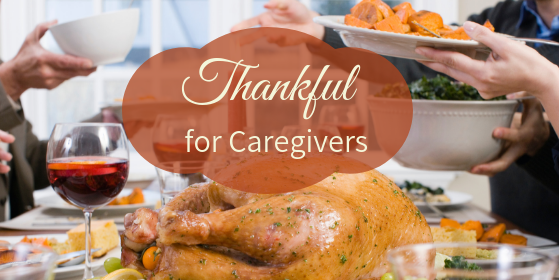Thanksgiving is a time to celebrate family connections.
However, for caregivers, family relationships can be complicated.
Sometimes, resentment may arise when one or two family members take on most of the caregiving duties. The reasons for such inequality may be understandable. Perhaps parents and one sibling live in the same town while other siblings live far away, so they can’t provide as much in-person assistance. Or maybe one sibling is single while the others have multiple children and competing demands on their time. Or perhaps, a spouse is reluctant to ask children or other family members for help and ends up taking on most of the caregiving duties.
Whatever the reason, caregiving situations like this are common and can have far-reaching consequences. The main caregiver’s health can disproportionately suffer from stress, including increased health risks for heart disease, stroke, cancer, and varied chronic diseases. In addition, depression, anxiety, obesity, and a weakened immune system are common. The resentments from the inequity may also lead to angry, hurt feelings that damage family relationships and cause pain even years after a loved one’s death.
So what can you do as a caregiver or a family member to create a healthy, stable caregiving situation? It’s not an easy question to answer and every family situation is different, but here are some ideas that have worked for other families.
1) Talk About It
It may sound obvious, but talking about a problem is the first step to a solution, and it’s often the most difficult step. It may be hard for a caregiver to say “I need help,” and it can be even harder to voice complaints about feeling alone with the caregiving duties. So what can one do? Even though it’s hard, making the effort to voice a problem is the first step to solving it. If you’re a friend or family member of a primary caregiver, reach out and ask the caregiver to share his or her needs and feelings.
2) Consider Your Message
For caregivers, practice what you want to say with a friend if you can, or, if not, record your thoughts on your phone so you can play them back to hear how you sound. Remember to use non-accusatory language. For example, “I need some help” is more likely to find a receptive audience than “I never get any help.” Or “I’m feeling exhausted from the stress of caring for mom” will elicit more empathy than “Don’t you see how exhausted I am.” Tone is important too, so try for a kind and empathetic tone as other people may have many things going on in their lives that complicate the situation. Sharing your feelings without blame can be tricky, but it’s much more likely to garner help.
3) Schedule a Family Meeting
Out-of-town family members may only be able to attend via phone or Skype, but that’s okay. Let your family know that you need help and that you would like to have a family meeting to brainstorm ideas to care for your loved one in a more healthy way. If you are a friend of family member of a primary caregiver, take on the duty of planning the meeting yourself. Many helpful ideas may emerge. Out-of-town family members may be able to plan visits so they can help with the caregiving for a week or two. They may be able to give money to pay for a caregiving service at times. Or perhaps they can take over arranging doctors’ appointments or other needs that can be handled by phone. Afterwards, maybe a monthly check-in meeting would provide further connection and assistance. If a phone call or in-person meeting won’t work, maybe a monthly email could let the family know what would benefit the caregiver and loved one most. Caregivers, keep an open mind and reach out in whatever way works for you. They are your family, and it’s important that they know how to help.
4) Don’t Give Up
If your initial efforts don’t succeed in the way you imagined, don’t give up. It’s important for both you and your loved one that you have a support network, and your family may need time to adjust to that idea. If you don’t have many or any family members who can or will help, think differently. You need a support network, so go out and get one. Look for support groups in your area. Contact the Department of the Aging or local government assistance programs. There are many people in your community from Meals on Wheels to teen groups who get immense satisfaction from helping others, so let them help you. You really will be doing them a favor.
People are often happiest when they are able to give to others, so by reaching out and accepting help, you are providing a heart-warming and uplifting experience to both your family and members of the community. Although it may not always feel like it, remember accepting help is truly a gift to others.
Thank you for reading and have a very Happy Thanksgiving!
—Kathi Koll
Written by Kathi Koll © 2019


